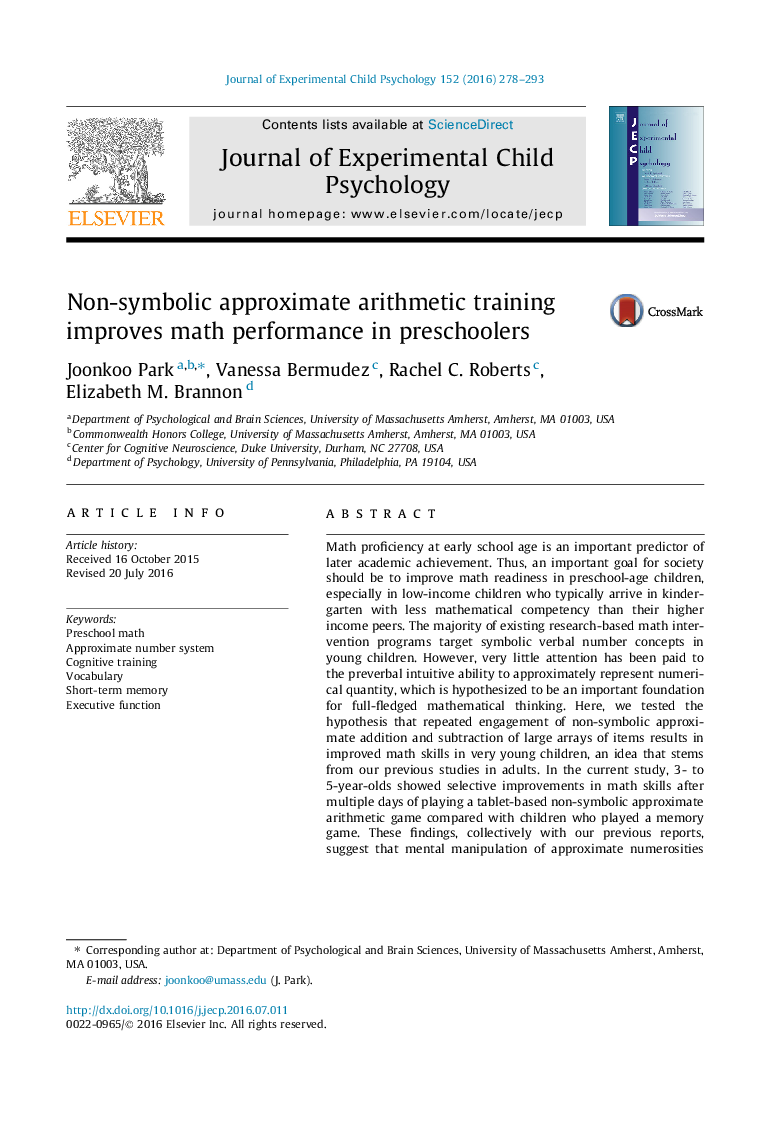| کد مقاله | کد نشریه | سال انتشار | مقاله انگلیسی | نسخه تمام متن |
|---|---|---|---|---|
| 7274380 | 1473460 | 2016 | 16 صفحه PDF | دانلود رایگان |
عنوان انگلیسی مقاله ISI
Non-symbolic approximate arithmetic training improves math performance in preschoolers
ترجمه فارسی عنوان
آموزش بی نظم تقریبی ریاضی باعث بهبود عملکرد ریاضی در کودکان پیش دبستانی می شود
دانلود مقاله + سفارش ترجمه
دانلود مقاله ISI انگلیسی
رایگان برای ایرانیان
کلمات کلیدی
ریاضی پیش دبستانی، سیستم تقریبی تعداد، آموزش شناختی، واژگان، حافظه کوتاه مدت، عملکرد اجرایی،
ترجمه چکیده
مهارت ریاضی در دوران مدرسه ابتدایی پیش بینی کننده مهم موفقیت تحصیلی بعد است. بنابراین یک هدف مهم برای جامعه باید بهبود آمادگی ریاضی در کودکان پیش دبستانی، به ویژه در کودکان کم درآمد باشد که معمولا با رضایت کمتر ریاضی از دانش آموزان با درآمد بالا برخوردار می شوند. اکثر برنامه های مداخله ای مبتنی بر تحقیق مبتنی بر ریاضی مبتنی بر هدف، مفاهیم شمارشی از نمادین کلامی در کودکان جوان هستند. با این حال، توجه بسیار کمی به توانایی بصری معکوس برای تقریبا نشان دادن مقدار عددی صورت گرفته است، که فرض می شود که پایه مهمی برای تفکر ریاضی تمام عیار است. در اینجا، فرضیه ما را بررسی کردیم که تکرار مشاجره تقریبی و تقسیم تقریبی غیرمستقیم از آرایههای بزرگ اقلام، موجب بهبود مهارتهای ریاضی در کودکان بسیار کوچک می شود، ایده ای که از مطالعات قبلی ما در بزرگسالان حاصل می شود. در مطالعه حاضر، 3 تا 5 ساله پس از چندین روز از بازی کردن یک بازی حساب تقریبی غیر سمبلیک مبتنی بر قرص در مقایسه با کودکانی که بازی حافظه ای را بازی کردند، پیشرفت های مشخصی در مهارت های ریاضی نشان داد. این یافته ها، همراه با گزارش های قبلی ما، نشان می دهد که دستکاری ذهنی از عددی تقریبی، یک ابزار مهم برای بهبود آمادگی ریاضی است، حتی در کودکان پیش دبستانی، که هنوز به معنای کلمات شمسی نیستند.
موضوعات مرتبط
علوم انسانی و اجتماعی
روانشناسی
روانشناسی رشد و آموزشی
چکیده انگلیسی
Math proficiency at early school age is an important predictor of later academic achievement. Thus, an important goal for society should be to improve math readiness in preschool-age children, especially in low-income children who typically arrive in kindergarten with less mathematical competency than their higher income peers. The majority of existing research-based math intervention programs target symbolic verbal number concepts in young children. However, very little attention has been paid to the preverbal intuitive ability to approximately represent numerical quantity, which is hypothesized to be an important foundation for full-fledged mathematical thinking. Here, we tested the hypothesis that repeated engagement of non-symbolic approximate addition and subtraction of large arrays of items results in improved math skills in very young children, an idea that stems from our previous studies in adults. In the current study, 3- to 5-year-olds showed selective improvements in math skills after multiple days of playing a tablet-based non-symbolic approximate arithmetic game compared with children who played a memory game. These findings, collectively with our previous reports, suggest that mental manipulation of approximate numerosities provides an important tool for improving math readiness, even in preschoolers who have yet to master the meaning of number words.
ناشر
Database: Elsevier - ScienceDirect (ساینس دایرکت)
Journal: Journal of Experimental Child Psychology - Volume 152, December 2016, Pages 278-293
Journal: Journal of Experimental Child Psychology - Volume 152, December 2016, Pages 278-293
نویسندگان
Joonkoo Park, Vanessa Bermudez, Rachel C. Roberts, Elizabeth M. Brannon,
